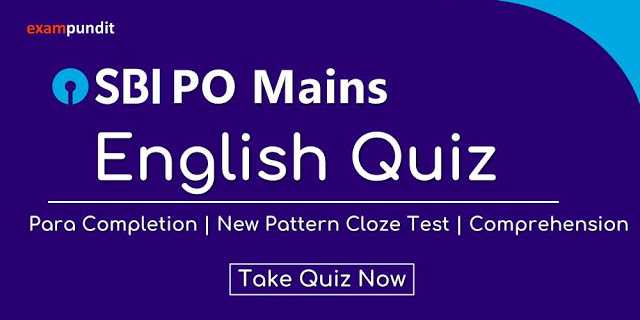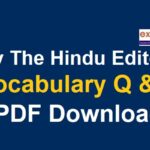Hello and welcome to exampundit. Here is a set of English Quiz for SBI PO Mains 2017. This can also be used for NICL AO Mains 2017.
Advertisement
(adsbygoogle = window.adsbygoogle || []).push({});
1. Beauty is not the goal of competitive sports, but
high-level sports are a prime venue for the expression of human beauty. The
relation is roughly that of courage to war. The human beauty we‘re talking
about here is beauty of a particular type; it might be called kinetic beauty.
Its power and appeal are universal. It has nothing to do with sex or cultural
norms. What it seems to have to do with, really, is human beings
‘reconciliation with the fact of having a body. Of course, in men‘s sports no
one ever talks about beauty or grace or the body. Men may profess their ―love‖
of sports, but that love must always be cast and enacted in the symbology of
war: elimination vs. advance, hierarchy of rank and standing, obsessive
statistics, technical analysis, tribal and/or nationalist fervor, uniforms,
mass noise, banners, chest-thumping, face-painting, etc.
high-level sports are a prime venue for the expression of human beauty. The
relation is roughly that of courage to war. The human beauty we‘re talking
about here is beauty of a particular type; it might be called kinetic beauty.
Its power and appeal are universal. It has nothing to do with sex or cultural
norms. What it seems to have to do with, really, is human beings
‘reconciliation with the fact of having a body. Of course, in men‘s sports no
one ever talks about beauty or grace or the body. Men may profess their ―love‖
of sports, but that love must always be cast and enacted in the symbology of
war: elimination vs. advance, hierarchy of rank and standing, obsessive
statistics, technical analysis, tribal and/or nationalist fervor, uniforms,
mass noise, banners, chest-thumping, face-painting, etc.
a) Regardless, the truth is that TV sports is to live sports
pretty much as Mills & Boons is to the felt reality of human love.
pretty much as Mills & Boons is to the felt reality of human love.
b) For reasons that are not well understood, war‘s codes are
safer for most of us than that of love‘s.
safer for most of us than that of love‘s.
c) The real discussion is more about a spectator‘s
experience of Sports, and its context.
experience of Sports, and its context.
d) The more combative a sport is, the more we fall in love
with it.
with it.
2. One is sometimes asked about the ―obstacles‖ that
confront young writers who are trying to do good work. I should say the
greatest obstacles that writers today have to get over, are the dazzling
journalistic successes of twenty years ago, stories that surprised and
delighted by their sharp photographic detail and that were really nothing more
than lively pieces of reporting. The whole aim of that school of writing was novelty—never
a very important thing in art. They gave us, altogether, poor standards—taught
us to multiply our ideas instead of to condense them. They tried to make a
story out of every theme that occurred to them and to get returns on every
situation that suggested itself. They got returns, of a kind. But their work,
when one looks back on it, now that the novelty upon which they counted so much
is gone, is journalistic and thin.
confront young writers who are trying to do good work. I should say the
greatest obstacles that writers today have to get over, are the dazzling
journalistic successes of twenty years ago, stories that surprised and
delighted by their sharp photographic detail and that were really nothing more
than lively pieces of reporting. The whole aim of that school of writing was novelty—never
a very important thing in art. They gave us, altogether, poor standards—taught
us to multiply our ideas instead of to condense them. They tried to make a
story out of every theme that occurred to them and to get returns on every
situation that suggested itself. They got returns, of a kind. But their work,
when one looks back on it, now that the novelty upon which they counted so much
is gone, is journalistic and thin.
a) A best seller was a book which somehow sold well simply
because it was selling well.
because it was selling well.
b) The especial merit of a good reportorial story is that it
shall be intensely interesting and pertinent today and shall have lost its
point by tomorrow.
shall be intensely interesting and pertinent today and shall have lost its
point by tomorrow.
c) Today, each new day demands new ideas and the writer can
never be sure whether he is going to come up with them or not.
never be sure whether he is going to come up with them or not.
d) But surprisingly the works they left behind are timeless.
3. So an atheist is someone who denies the existence of a
god with the characteristics as mentioned. In other words: he denies the
existence of ‗God‘. We find this approach not only with Nagel, but also with Robin
Le Poidevin, Daniel Harbour and Paul Edwards. Atheism as a-theism has clear
advantages. We know what we‘re talking about, and an impressive tradition in
the history of Western thought can be interpreted as a discussion of the
existence of a God with clearly-definable characteristics.
god with the characteristics as mentioned. In other words: he denies the
existence of ‗God‘. We find this approach not only with Nagel, but also with Robin
Le Poidevin, Daniel Harbour and Paul Edwards. Atheism as a-theism has clear
advantages. We know what we‘re talking about, and an impressive tradition in
the history of Western thought can be interpreted as a discussion of the
existence of a God with clearly-definable characteristics.
a) Discussions about the existence of God are discussions
about the compatibility of the characteristics ascribed to the divine in the
theistic tradition.
about the compatibility of the characteristics ascribed to the divine in the
theistic tradition.
b) Great philosophers and theologians from Plato to
Augustina have all participated in this discussion.
Augustina have all participated in this discussion.
c) This is not a conversation about the different attitudes
people have with regard to the ‗ultimate ideals of life‘ but about the
characteristics of the theistic God.
people have with regard to the ‗ultimate ideals of life‘ but about the
characteristics of the theistic God.
d) Thinkers from all three faiths grappled with the general
philosophical problems that needed solving.
philosophical problems that needed solving.
4. If you strike a child, take care that you strike it in
anger, even at the risk of maiming it for life. A blow in cold blood neither
can nor should be forgiven. If you beat children for pleasure, avow your object
frankly, and play the game according to the rules, as a foxhunter does; and you
will do comparatively little harm. No foxhunter is such a cad as to pretend
that he hunts the fox to teach it not to steal chickens, or that he suffers
more acutely than the fox at the death.
anger, even at the risk of maiming it for life. A blow in cold blood neither
can nor should be forgiven. If you beat children for pleasure, avow your object
frankly, and play the game according to the rules, as a foxhunter does; and you
will do comparatively little harm. No foxhunter is such a cad as to pretend
that he hunts the fox to teach it not to steal chickens, or that he suffers
more acutely than the fox at the death.
a) You cannot treat your child as your property and do what
you like with it as far as it will let you.
you like with it as far as it will let you.
b) Now, there is a Society for the Prevention of Cruelty to
Children which has come up with a set of rules for child punishment.
Children which has come up with a set of rules for child punishment.
c) Don‘t abuse your child and expect him to consider it
criticism.
criticism.
d) Remember that even in child-beating there is the
sportsman‘s way and the cad‘s way.
sportsman‘s way and the cad‘s way.
5. Childhood is a stage in the process of that continual
remanufacture of the Life Stuff by which the human race is perpetuated. The
Life Force either will not or cannot achieve immortality except in very low organisms:
indeed it is by no means ascertained that even the amoeba is immortal. Human
beings visibly wear out, though they last longer than their friends the dogs.
Turtles, parrots, and elephants are believed to be capable of outliving the
memory of the oldest human inhabitant. But the fact that new ones are born conclusively
proves that they are not immortal.
remanufacture of the Life Stuff by which the human race is perpetuated. The
Life Force either will not or cannot achieve immortality except in very low organisms:
indeed it is by no means ascertained that even the amoeba is immortal. Human
beings visibly wear out, though they last longer than their friends the dogs.
Turtles, parrots, and elephants are believed to be capable of outliving the
memory of the oldest human inhabitant. But the fact that new ones are born conclusively
proves that they are not immortal.
a) And as long as they‘re subject to birth and death,
they‘ll never attain enlightenment.
they‘ll never attain enlightenment.
b) Do away with death and you do away with the need for
birth.
birth.
c) Birth is a fresh attempt to produce the just man made
perfect.
perfect.
d) Why is it that we rejoice at a birth and grieve at a
funeral?
funeral?
Answers:
1. (b). The paragraph talks
about how the love for sports is expressed in terms of war codes rather than
the general and more prevalent ways of expression of love. Option (b) takes
this forward by saying that this happens for reasons unknown. Option (a) is
incorrect as the paragraph does not aim to compare watching sport live to
watching it on television. Option (c), although not irrelevant to the
discussion, does not fit with the paragraph semantically. Option (d) is
incorrect as, according to the paragraph, the love for sports in general is
described in war codes irrespective of its combative nature.
about how the love for sports is expressed in terms of war codes rather than
the general and more prevalent ways of expression of love. Option (b) takes
this forward by saying that this happens for reasons unknown. Option (a) is
incorrect as the paragraph does not aim to compare watching sport live to
watching it on television. Option (c), although not irrelevant to the
discussion, does not fit with the paragraph semantically. Option (d) is
incorrect as, according to the paragraph, the love for sports in general is
described in war codes irrespective of its combative nature.
2. (b). The author talks about
the work of a journalist and what makes a good story/piece of writing. Option
(a) is incorrect as it talks not about journalistic story but about bestselling
books. The author in the paragraph says that the brilliant stories that he is
talking about are not timeless but were dependent on the novelty factor for
their success. Option (b) takes this forward by explaining that a good
reportorial story should be interesting and pertinent in the context of the
time it is presented and then may die.
the work of a journalist and what makes a good story/piece of writing. Option
(a) is incorrect as it talks not about journalistic story but about bestselling
books. The author in the paragraph says that the brilliant stories that he is
talking about are not timeless but were dependent on the novelty factor for
their success. Option (b) takes this forward by explaining that a good
reportorial story should be interesting and pertinent in the context of the
time it is presented and then may die.
3. (b). The penultimate sentence
mentions the impressive tradition in the history of western thought. Option (b)
is the answer because it asserts the point made in the penultimate sentence. A
common thread in the paragraph is a reference to people in order to
substantiate a point made. Option (a) can be ruled out because it makes a
reference to the discussion about the existence of God but this option should
come in once the author has explained or substantiated the penultimate
sentence. Option (c) can be ruled out because the scope of the paragraph is not
to define the scope of the argument. Option (d) can be ruled out because it
goes beyond the scope of the paragraph.
mentions the impressive tradition in the history of western thought. Option (b)
is the answer because it asserts the point made in the penultimate sentence. A
common thread in the paragraph is a reference to people in order to
substantiate a point made. Option (a) can be ruled out because it makes a
reference to the discussion about the existence of God but this option should
come in once the author has explained or substantiated the penultimate
sentence. Option (c) can be ruled out because the scope of the paragraph is not
to define the scope of the argument. Option (d) can be ruled out because it
goes beyond the scope of the paragraph.
4. (d). Option (d) is correct.
The author talks about child beating and what not to do in case one is
compelled to beat a child. He asks us not to become a cad in the act. ‘Cad’ is
also the keyword that can be used to make the reference of option (d) with the
passage. Option (b) is not relevant to the passage. Options (a) and (c) talk
about the effect on or acceptance by the child of the act of beating but the
passage deals with the moral issues associated with the person doing the act.
The author talks about child beating and what not to do in case one is
compelled to beat a child. He asks us not to become a cad in the act. ‘Cad’ is
also the keyword that can be used to make the reference of option (d) with the
passage. Option (b) is not relevant to the passage. Options (a) and (c) talk
about the effect on or acceptance by the child of the act of beating but the
passage deals with the moral issues associated with the person doing the act.
5. (b). The author states that
everyone must die and that even the lowest forms wear out and cannot live forever.
He says that the fact that new organisms are born prove that the previous ones
are not immortal. The next line should explain the connection between this
reason and the assertion made by the author earlier. Option (b) explains this
as it says that the need of birth arises because of the inevitability of death.
If new organisms are produced without the older ones dying then, at one stage
there would be no room for the new organisms. Also, if there is no reproduction
and death continues then no one will be left after sometime. Option (c) is
incorrect because the author is not talking about the ‘just man’ but about life
and death in all organisms. Option (a) is out of the scope of the passage as
the author does not talk about enlightenment. Also the pronoun ‘they ‘in option
(a) does not have a satisfactory antecedent in the passage. Option (d) is
incorrect as the author does not talk about our feeling towards the two
mentioned events.
everyone must die and that even the lowest forms wear out and cannot live forever.
He says that the fact that new organisms are born prove that the previous ones
are not immortal. The next line should explain the connection between this
reason and the assertion made by the author earlier. Option (b) explains this
as it says that the need of birth arises because of the inevitability of death.
If new organisms are produced without the older ones dying then, at one stage
there would be no room for the new organisms. Also, if there is no reproduction
and death continues then no one will be left after sometime. Option (c) is
incorrect because the author is not talking about the ‘just man’ but about life
and death in all organisms. Option (a) is out of the scope of the passage as
the author does not talk about enlightenment. Also the pronoun ‘they ‘in option
(a) does not have a satisfactory antecedent in the passage. Option (d) is
incorrect as the author does not talk about our feeling towards the two
mentioned events.
ep
Recommended Test Series
Sponsored
(adsbygoogle = window.adsbygoogle || []).push({});
Regards
Team ExamPundit
This post was last modified on November 27, 2017 8:52 am





